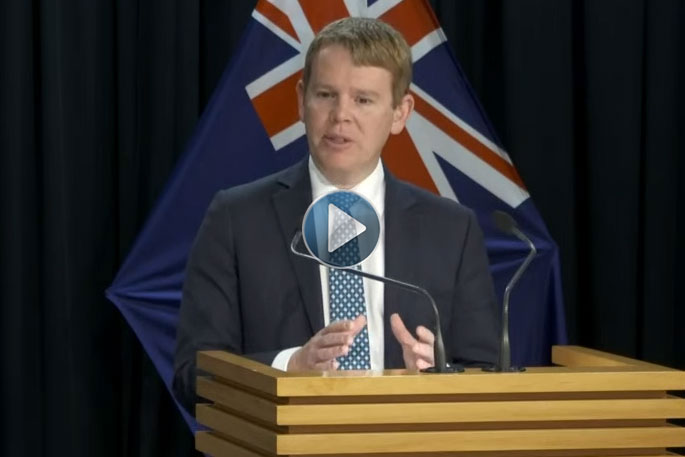The Minister for COVID-19 Response, Chris Hipkins and Director-General of Health, Dr Ashley Bloomfield, is providing an update to the media today.
Cabinet has confirmed formal Government approval for use of the Pfizer/BioNTech COVID-19 vaccine, COVID-19 Response Minister Chris Hipkins says.
Following the provisional approval by Medsafe announced last week, formal Government approval for use represents another critical step in the process of ensuring the vaccine is safe and effective for New Zealanders.
'The Government is continuing to go by the book and has carefully considered the ‘decision to use' the Pfizer/BioNTech vaccine as part of our nationwide programme,” says Hipkins.
'Medsafe's provisional approval was step one and ‘decision to use' is a further greenlight on the road to our roll-out. After receiving further advice, Cabinet has endorsed officials' advice to use Pfizer/BioNTech.
'While we've found the ‘decision to use' process around this first application to be relatively straightforward, the Government also recognise there will be a huge amount of further detail to consider as the other vaccines in our portfolio of 14.91 million courses go through the Medsafe approval process.
'Now we've reached the crucial stage of approval for the first vaccine, we are in a much better position to start having a conversation with New Zealanders about how we plan to proceed, recognising the natural questions some will have. Information campaigns will start from next week to support this.
'As part of our portfolio, we have secured up to 750,000 courses of the Pfizer COVID-19 vaccine through an Advance Purchase Agreement, and we are seeking a further small allocation through the COVAX Facility.
'When the first batch of vaccine arrives, we will be ready to go. We will start vaccinating our border workers within days of arrival and then the people they live with. People such as cleaners, the nurses who undertake health checks in MIQ, security staff, customs and border officials, airline staff and hotel workers will be among the first to get the vaccine.”
Hipkins confirmed the vaccine has been assessed by the Environmental Protection Authority (EPA) and has gained its approval for use here.
'All these steps can provide further assurances to the New Zealand public that this vaccine is safe to use.
'While vaccination of our border and other frontline workers takes place, we will continue to receive advice from officials on the other vaccines in our portfolio. Medsafe is in regular conversations with AstraZeneca and Janssen and has begun engagement with Novavax. A similar rigorous approval process is being followed.
'New Zealand continues to play a role internationally and specifically with the Pacific countries participating in the Polynesian Health Corridors programme.
"These countries, which include the Cook Islands, Niue, Tokelau, Samoa, Tonga and Tuvalu, will be given access to the New Zealand vaccine portfolio.
'There is still a long way to go but as a country we've made strong and significant progress against COVID-19 since it first emerged as a serious global threat about 12 months ago.
"The Government will leave nothing to chance to ensure that progress continues."
Following Medsafe's provision approval, the COVID-19 Vaccine Technical Advisory Group made recommendations on the ‘decision to use', which the Government today endorsed. They are:
The Pfizer COVID-19 vaccine is suitable for use in New Zealand for those 16 years of age and over, with some additional recommendations including:
- ensuring adequate information is provided, particularly around expected common side effects, for example fever, muscle pain, fatigue;
- requiring a 30-minute observation period after the vaccine has been administered;
- patients receiving specific therapies should not receive the vaccine. These therapies are pembrolizumab (Keytruda), nivolumab (Opdivo), ipilimumab (Yervoy), atezolizumab (Tecentriq);
- that pregnant women are advised to discuss the risks and benefits of receiving the Pfizer vaccine; and
- that it is suitable for use in lactating women.
The group noted that clinical trials have not yet included those under 16 years.
While this is quite normal for this stage of clinical trials, it does mean that the group does not have safety and efficacy evidence to support the use of the Pfizer vaccine for children and rangatahi aged less than 16 years.
Given this, the group recommend that the Pfizer vaccine is only used for people aged 16 years or older.
This could be reconsidered when more detail is made available.



0 comments
Leave a Comment
You must be logged in to make a comment.